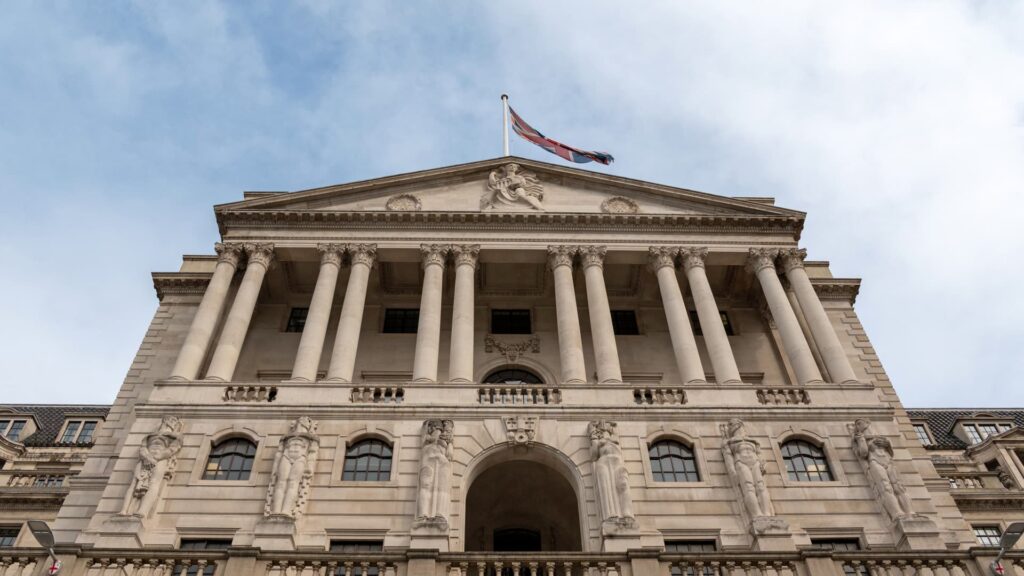The Union flag flies on a pole atop the Bank of England on August 7, 2025 in the City of London.
Niklas Hallen | AFP | Getty Images
LONDON – The Bank of England took a cautious stance on Thursday ahead of the government’s autumn budget in November, narrowly voting to keep interest rates on hold.
Five of the nine-member BOE Monetary Policy Committee voted to keep the key interest rate, known as the Bank Rate, unchanged at 4%, while four chose to cut it by 25 basis points.
A poll of economists compiled by Reuters predicted that the vote would be narrower than expected, with a 6-3 vote in favor of leaving the measure unchanged.
BOE Governor Andrew Bailey has hinted to CNBC that a rate cut is imminent, and economists are currently pricing in a rate cut before Christmas.
“We’re past the peak limit, which is to be expected given that we’ve cut rates five times[since August 2024]. My sense is that policy is still restrictive, but we’re past the peak limit,” he told CNBC’s Ritika Gupta.
Governor Bailey said he would closely monitor inflation and labor market data released before the last monetary policy meeting of the year (December 18) regarding the timing of the next interest rate cut.
“We will certainly consider the evidence we see over the remainder of this year and between now and our last meeting,” Mr Bailey said, adding that the MPC could also factor in Finance Minister Rachel Reeves’ budget, due to be tabled on November 26, in its assessment of the central bank.
The central bank said in a statement that inflation has likely peaked at 3.8% in September and that a disinflationary trend is underway. This “remains underpinned by a restrictive monetary policy stance”, he said.
“This is reflected in moderating wage growth and service price inflation. The underlying disinflation is supported by slower economic growth and the accumulation of labor market slack,” the bank added.
The BOE warned that future rate cuts “will therefore depend on developments in the inflation outlook. If disinflationary developments continue, bank rates are likely to continue on a moderate downward trajectory.”
“I think the dovish side is winning the argument on this one,” Santander CIB’s UK chief economist Victoria Clark told CNBC on Thursday.
“(BOE Governor Andrew) Bailey has made it clear that he wants a little more data, and certainly my judgment was that there was a lot of value in waiting for December. We have two more CPI (inflation) numbers coming up, two more labor market numbers coming up, and of course, we have this huge budget,” she told CNBC’s Decision Time.
Yields on British government bonds fell across the board, with the yield on the benchmark 10-year government bond dropping by almost 3 basis points. Meanwhile, the British pound pared its previous gains and rose 0.18% against the US dollar.
Thursday’s meeting was the last before the fall budget proposal later this month. Economists said they thought the central bank was likely to keep interest rates on hold, but said it was not a given.
“It’s not a question of whether they’re going to cut rates at some point. The answer is yes. We believe they will,” Dean Turner, head of eurozone and UK economist at UBS Global Wealth Management’s Chief Investment Office, said on Tuesday. “If policy tightens, inflation falls and growth is lackluster, interest rates will fall. The challenge is predicting the timing,” he added.
cut is coming
The general consensus is that rate setters could cut rates as early as December, and again into next year in response to expected cooling in inflation (inflation was 3.8% in September, unchanged for the third straight month) and softer labor market data.
Most MPC members are more concerned about the impact of cutting rates too soon rather than too late, and the BOE will want to see data and evidence of continued downward expectations for wage growth to slow to a pace consistent with its target before voting to cut rates again, Oxford Economics said in its analysis.
“If we are right and the BoE pauses (this week), the question will be when the next rate cut will occur,” Alan Monks, chief UK economist at JPMorgan, said in a note.
“We have argued that further downside surprises in inflation and labor market data will dictate that. For example, the rise in the unemployment rate to 4.9% in September could be significant, as well as further modest sequential increases in core CPI services and private pay.”
autumn budget
The fact that this month’s central bank meeting was held ahead of the fall budget proposal on November 26 gave BOE policymakers another reason to pause.
Rachel Reeves, the Chancellor of the Exchequer, is widely expected to announce tax increases to fill a fiscal black hole estimated at between 20 billion and 50 billion pounds ($20 billion to $65.2 billion), based on assumptions such as lower productivity, debt repayments and the cost of a U-turn in welfare spending cuts, among other things.
Earlier this week, Reeves clearly signaled that tax increases were coming and that he would consider raising income taxes as one way to raise revenue, but he did not provide further details. Tax increases are likely to reduce consumer demand and serve to further suppress inflation.

“The inclusion of an income tax hike (in the budget) would further weigh on real household incomes from high inflation and slowing wage growth,” Berenberg economist Andrew Wishart said in a note Friday. “Inflation is likely to moderate as these factors weigh on demand.”
“That would allow the Bank of England to cut interest rates by 25 basis points to 3.50% at least twice next year. Bringing forward fiscal tightening would open the door to a third rate cut to 3.25% in 2026,” he added.


